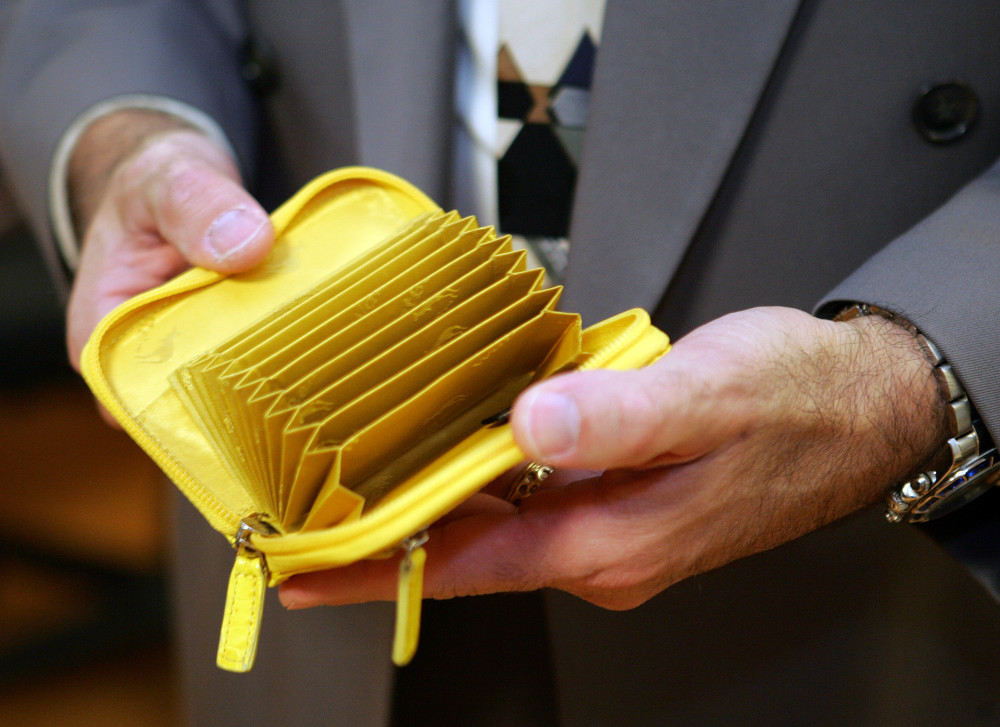By Laura Woods
GOBankingRates.com
WWR Article Summary (tl;dr) Laura Woods takes a look at the five items commonly found in wallets. If any of these 5 are in yours, find out what these items could mean for you and your financial future.
GOBankingRates
You carry your wallet with you everywhere.
It contains the life essentials needed to get by when you’re not at home.
The necessities inside a wallet are different for everyone. On the surface, the contents of your wallet might seem like a simple matter of preference, but they can serve as a key indicator of your money habits. If you’re trying to be more responsible with your finances, it’s time to take inventory.
Develop better money habits by being cognizant of what you’re toting around in your handbag or back pocket.
The following five items are commonly found in wallets; if any are in yours, find out what these items in your wallet could mean for you and your financial future.
EXPIRED GIFT AND CREDIT CARDS
Your money habits likely need some fine-tuning if you’re carrying around expired gift or credit cards. Chances are, you don’t even know these useless items are in your wallet.
If you’re not in tune with your wallet, it’s safe to assume you probably don’t have a solid grasp of your finances. Be honest with yourself: You don’t remember the last time you checked your bank or credit card statements.
Consequently, you’ve probably overdrawn your checking account at least once or twice, and you’ve likely racked up a bit of credit card debt.
Developing better money habits is much easier than you think. Start by clearing the clutter from your wallet at least monthly, and when you’re done, review your bank and credit card statements. Being in the know with your finances is the first step toward developing better money habits.
RECEIPTS
“While many people keep receipts in their wallet with the intention of checking expenses against their monthly statement, most people never actually get around to doing this review,” said Evan Harris, who focuses on investor relations at SD Equity Partners. “Thus, receipts in someone’s wallet usually indicate an intent to do financial review without the follow-through.”
Keeping receipts can be a good thing, but make sure you’re actually using them to monitor your spending. You can improve your money habits by developing a system of order inside your wallet or regularly transferring them to a space at home where you’ll remember to reconcile your expenses in a timely manner.
“As a money lender, I am in the minority, I do store receipts, but I also make sure to do a monthly review to ensure my statement matches my receipts,” Harris said.
EVERY ITEM THAT FITS
Ben Friedman, head of operations at All Set, a Boston-based startup that helps customers find top house cleaners with verified reviews, admitted to having a wallet that rivals George Costanza’s on “Seinfeld.”
“For some reason, I feel I have to have every medical card, airline rewards card, recent business card and a minimum of $100 cash in my wallet,” Friedman said. “I think it’s because I always want to be prepared, and I almost feel like I’m missing something when I don’t have what I feel is important and necessary information in my wallet at all times.”
If your wallet is stocked with everything you could possibly need, you’re probably doing the same for your financial future. Chances are that your emergency fund, retirement account and insurance policies are all in excellent standing. A heavy wallet can be taxing, so take inventory to make sure you’re not toting around unnecessary items.
ONLY CREDIT CARDS
Like many others, John Liston’s wallet contains only plastic. The All Set manager of strategy and operations never carries cash and rarely has a debit card with him.
“Relying exclusively on credit cards protects you substantially more than other options,” Liston said. “In the event that a credit card is lost or stolen, you can cancel the card and rely on your card’s protections.”
Bradley Shaw, digital marketing and online consulting expert at SEO Expert Brad Inc., doesn’t even have a wallet. Instead, he carries only an American Express card with him.
“I track every penny spent, and that is very difficult to do with cash,” Shaw said. “By using one credit card for 99 percent of my spending, I rack up Amex points and easily track where my money is spent.”
Relying exclusively on plastic can be good or bad, depending on your money habits. Stick with this system if you’re staying out of debt, but consider switching to cash if you’re having trouble controlling your spending.
ONLY CASH
Many people rely solely on plastic to make it through the day, but not you. The only form of payment in your wallet is cold, hard cash.
Because you can only spend what you have, you might be living a debt-free lifestyle. Your responsible money habits have likely helped you reach a level of financial health many people will never attain. It seems you don’t really need money advice, so keep up the good work.
Despite your fantastic money habits, consider keeping a credit card in your wallet for emergencies. Plus, putting a few charges on a credit card each month and paying off the balance in full will help you build credit.
Plenty of credit cards offer rewards that let you cash in just for making standard purchases. Only you can gauge your level of self-discipline, but if you think you can resist the temptation to spend, keep that in mind.














































































































































































































































































































































































